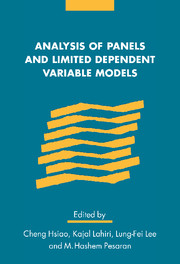Book contents
- Frontmatter
- Contents
- List of contributors
- Foreword
- Introduction
- 1 A note on left censoring
- 2 Autoregressive models with sample selectivity for panel data
- 3 Mixture of normals probit models
- 4 Estimation of dynamic limited-dependent rational expectations models
- 5 A Monte Carlo study of EC estimation in panel data models with limited dependent variables and heterogeneity
- 6 Properties of alternative estimators of dynamic panel models: an empirical analysis of cross-country data for the study of economic growth
- 7 Modified generalized instrumental variables estimation of panel data models with strictly exogenous instrumental variables
- 8 Expectations of expansions for estimators in a dynamic panel data model: some results for weakly exogenous regressors
- 9 Re-examining the rational expectations hypothesis using panel data on multi-period forecasts
- 10 Prediction from the regression model with one-way error components
- 11 Bayes estimation of short-run coefficients in dynamic panel data models
- 12 Bias reduction in estimating long-run relationships from dynamic heterogeneous panels
- CV of G.S. Maddala
- Index
Introduction
Published online by Cambridge University Press: 22 September 2009
- Frontmatter
- Contents
- List of contributors
- Foreword
- Introduction
- 1 A note on left censoring
- 2 Autoregressive models with sample selectivity for panel data
- 3 Mixture of normals probit models
- 4 Estimation of dynamic limited-dependent rational expectations models
- 5 A Monte Carlo study of EC estimation in panel data models with limited dependent variables and heterogeneity
- 6 Properties of alternative estimators of dynamic panel models: an empirical analysis of cross-country data for the study of economic growth
- 7 Modified generalized instrumental variables estimation of panel data models with strictly exogenous instrumental variables
- 8 Expectations of expansions for estimators in a dynamic panel data model: some results for weakly exogenous regressors
- 9 Re-examining the rational expectations hypothesis using panel data on multi-period forecasts
- 10 Prediction from the regression model with one-way error components
- 11 Bayes estimation of short-run coefficients in dynamic panel data models
- 12 Bias reduction in estimating long-run relationships from dynamic heterogeneous panels
- CV of G.S. Maddala
- Index
Summary
The chapters in this volume bring together important recent advances in the areas of (i) econometrics of panel data, (ii) limited dependent variable models, and (iii) limited dependent variable models with panel data. Panel data offers researchers many more possibilities than pure cross-sectional or time series data. Like cross-sectional data, panel data describes each of a number of individuals. Like time series data, it describes changes through time. By blending characteristics of both cross-sectional and time series data, panel data can be used, for example, to (i) expand sample size, (ii) allow the specification of more complicated behavioral hypotheses, (iii) capture cross-sectional variation and dynamic behavior, (iv) lessen the problem of multicollinearity, (v) provide possibilities for reducing omitted variable and estimation biases, (vi) improve accuracy of parameter estimates, (vii) obtain more accurate prediction of individual outcomes. However, the analysis of panel data also raises a number of new issues. For instance, in the case of short dynamic panel data models with large cross-section units, it is known that dealing with the initial values and incidental parameters problem can be complex. In other applications, such as non-linear panel data models with fixed effects, a general solution to the problem may not exist. A notable example is estimation of probit models with fixed effects. Also panel data based on economic surveys are very often qualitative in nature, and have limited variations due to self-selection, and truncation.
- Type
- Chapter
- Information
- Publisher: Cambridge University PressPrint publication year: 1999



